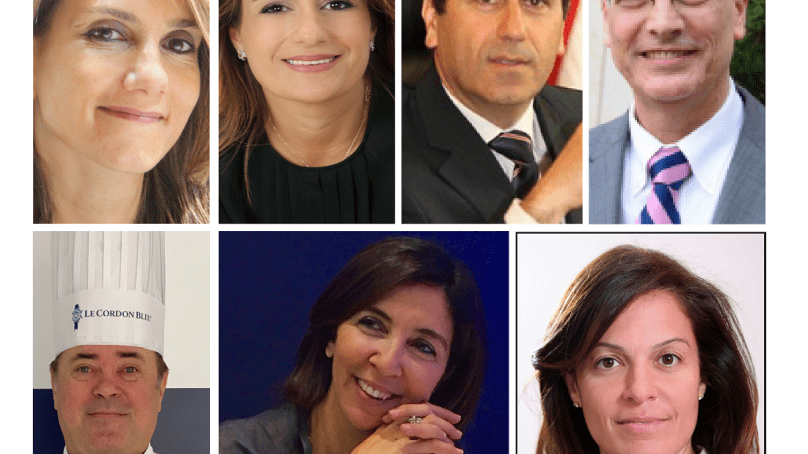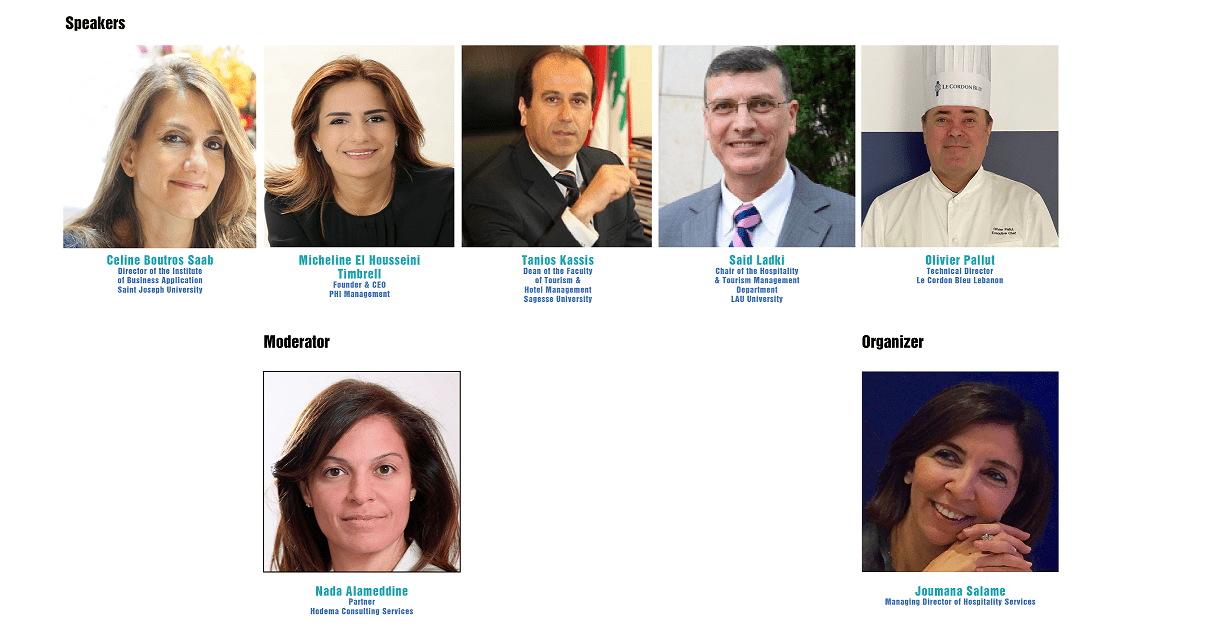Powered by Hospitality News Middle East and funded by the USAID Lebanon Enterprise development (LED) project, Hospitality News Talks held its third virtual roundtable on February 25 — “Hospitality education in Lebanon in 2021 and beyond.” The online session, one of 12 such talks moderated by Hodema Consulting Services, invited a panel of academics and education providers to discuss the latest developments in hospitality education, learning and development, and how their respective institutions have been responding to the pressures of Covid-19 as well as challenges specific to Lebanon: currency devaluation, political uncertainty, etc.
The panel included: Celine Boutros, director of the Institut de Gestion des Entreprises (IGE), Saint Joseph University; Micheline Housseini Timbrell, founder and CEO of PHI Management; Tanios Kassis, dean of the Faculty of Tourism & Hotel Management, Sagesse University; Said Ladki, chair of the Hospitality and Tourism Management Department, Lebanese American University; and Olivier Pallut, technical director of Le Cordon Bleu Lebanon. Nada Alameddine, partner of Hodema Consulting Services, moderated the session.
Ladki began by saying that Lebanon will continue to produce hospitality talent thanks to a distinguished education system that nurtures multilingualism, adaptability and professionalism. When asked about the impact, the economic crisis and the coronavirus pandemic have had on student numbers at LAU, he said: “Overall, we have seen an increase in enrollment at our university. In our department alone, there have been around nine cases of students who were planning to study abroad but decided to stay in Lebanon and transferred to LAU.
Kassis spoke about the competitive advantage Lebanon used to have in the region. He explained that while hospitality professionals continue to emerge from Lebanon, other countries in the Arab world are investing in their people more and more. Tourism has become a focal point in countries such as Qatar, Bahrain and Saudi Arabia, so local talent is in demand. Kassis also added how important it is for Lebanese students to obtain experience abroad. “I used to tell students to go outside and work abroad and come back. They need to see something else — other cultures. International exposure is essential.”
At IGE, Saint Joseph University, Boutros said that although the practical part of their curriculum has suffered, the shift to online education has been relatively smooth.
“Despite the bad infrastructure in Lebanon, we have been able to increase the quality of the education. We have partnered with foreign professors and overseas institutions.” She also mentioned that the explosion at Beirut Port provided an opportunity for students to put their skills to the test. “We opened a kitchen to provide 500 meals to families affected by the explosion. It allowed our students to engage in a large-scale operation and fulfill an important social duty.”
“Notes can be shared, but you cannot teach cooking sessions online; you have to feel the heat,” said Pallut. Indeed, classes have been suspended at Le Cordon Bleu Lebanon because of the pandemic. He went on to add that although the country is going through a dramatic period, economic revival will come and bring with it many opportunities for chefs to excel in Lebanon. “Lebanon has not been very present in culinary production in the GCC region. There is a demand for it, which is why Le Cordon Bleu established a school here. We aim to educate and inspire.”
Housseini Timbrell mentioned the fact that bad internet connection and a general lack of digital savviness have been tricky for many in Lebanon. However, she said that these unusual conditions have highlighted new ways of sharing information: microlearning, podcasts, webinars, etc. “We will be seeing less and less of the traditional full-day trainings and more three-hour sessions designed to keep participants engaged. The ability to concentrate at home is often harder and keeping their attention can be tough.” She also said: “Even with rules regulating the employment market in the Gulf, such as Saudization and Bahrainization, I believe that Lebanese talent is still in demand.
The panel mentioned that online learning is not a new thing but that the pandemic forced many universities to adapt to a largely virtual system and to upgrade their online offerings, which has been extremely difficult in a country with poor infrastructure and unreliable internet. In general, this adjustment has been harder for professors than tech-savvy students.
A technology-based way of teaching has been complicated for hospitality faculties to implement due to the fundamentality of practical lessons in the kitchen, restaurants, reception, etc. Yet, certain institutions have been able to navigate this tricky period and offer small-group sessions for certain parts of the curriculum that cannot be taught online. This is expected to continue and improve with the vaccine rollout in Lebanon and lockdown restrictions being eased.
It is believed that hybrid learning will be a way to ensure some form of continuity until the coronavirus is a distant memory. In the meantime, keeping students motivated and focused while they are at home remains a challenge. Making the online experience informative and fun with short, engaging sessions — “learntertainment” — and the creation of virtual rooms for students to work in groups have been successful tools. Universities in Lebanon need to continue investing financially to offer students the best possible education that’s relevant to current trends and demand. They must foster relationships with foreign institutions and respected professors overseas to provide a broader perspective, and this has become easier to achieve online.
Covid-19 highlighted the need for students to be aware of and learn about online trends shaping the hospitality and tourism industries. Indeed, digital marketing and advertising modules have been added to many curriculums as a direct result of the pandemic. It is expected that further emphasis will be placed on these topics as time goes on and the digital world continues to evolve.
While the hospitality and tourism industries have suffered immensely on a global scale, the panel was optimistic about recovery and the creation of jobs for graduates and professionals. In Lebanon, the departure of some foreign staff and the decision of companies to employ from a local pool would undoubtedly create employment opportunities. In addition, the devaluation of the Lebanese pound has made Lebanon a cheap holiday destination. However, this depends on political stability.
The panel encouraged students to always think broadly and to take advantage of the knowledge and expertise of industry leaders, especially foreigners and expats working in Lebanon. They also highlighted the importance of practical experience and overseas travel to discover new cultures and gain international exposure before pursuing a postgraduate degree.
















